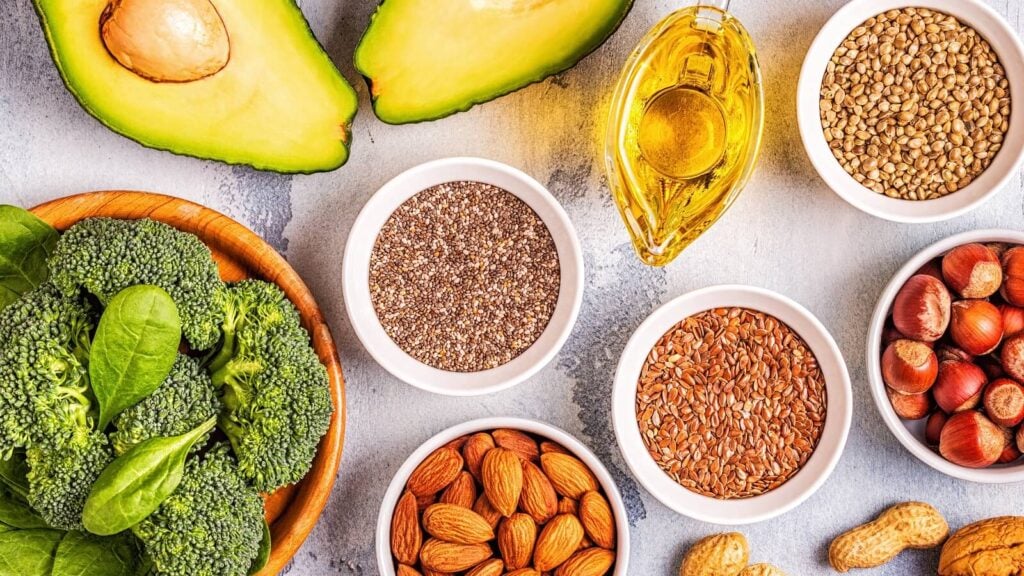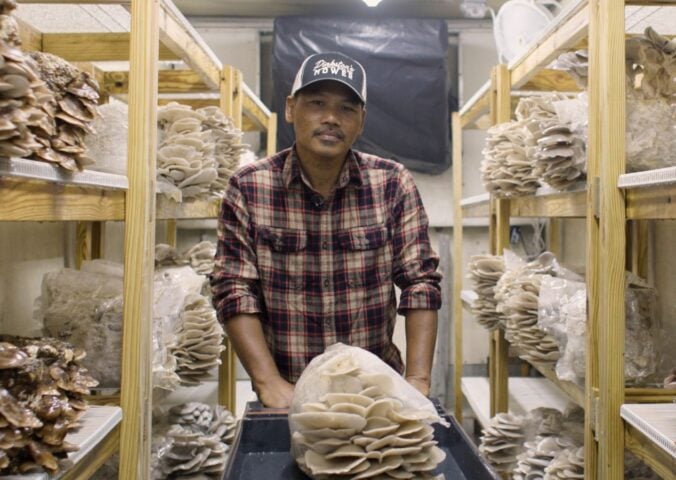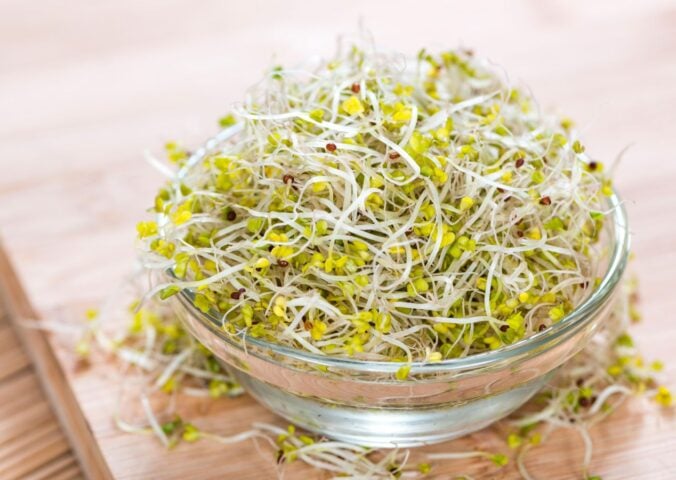This is a sponsored post * [what is this?]
The fish oil industry is worth billions, yet safer, cleaner alternatives don’t cost the earth.
The Omega-3 fatty acid market remains buoyant. Used throughout the world in all kinds of products, including infant formula, medicine, clinical nutrition, foods, beverages, and pet food, these fatty acids as dietary supplements now account for the largest market share of the whole Omega-3 by volume and by value.
Put simply, Omega-3 fatty acids are essential fats that every single one of us must get from our diet 1. Study after study has demonstrated that these molecules have important benefits for our bodies and brains, and have been shown to fight depression2, reduce fat in the liver3, lower blood triglycerides4, and even help lower the risk of asthma5.
The NHS has minimum recommendations6 for our daily intake of these oils, advising that the best way to ensure optimal Omega-3 intake is to eat fatty fish rich in these wonder molecules at least twice per week. While non-animal sources such as flaxseeds and walnuts get a mention in the NHS guidelines for vegetarians7, yet these are not ideal sources, requiring significant intake to match the benefits of their fish-based counterparts.
With general public awareness of Omega-3 focussed on marine sources, rising demand has piled significant pressure on the global fish oil market8; as awareness among medical professionals and laypeople about the importance of these oils has grown, it is unlikely producers can ever catch enough fish to fulfil this demand.
The devastating impact of the fishing industry on the environment and increasing awareness of the trillions of sea animals killed annually is fuelling the need for sustainable alternatives to fish oil. Yet, cleaner, more ethical options already exist, with one in particular available right now from a Glastonbury-based startup committed to ensuring good health isn’t confusing, expensive or complicated.
What are Omega-3 fatty acids?
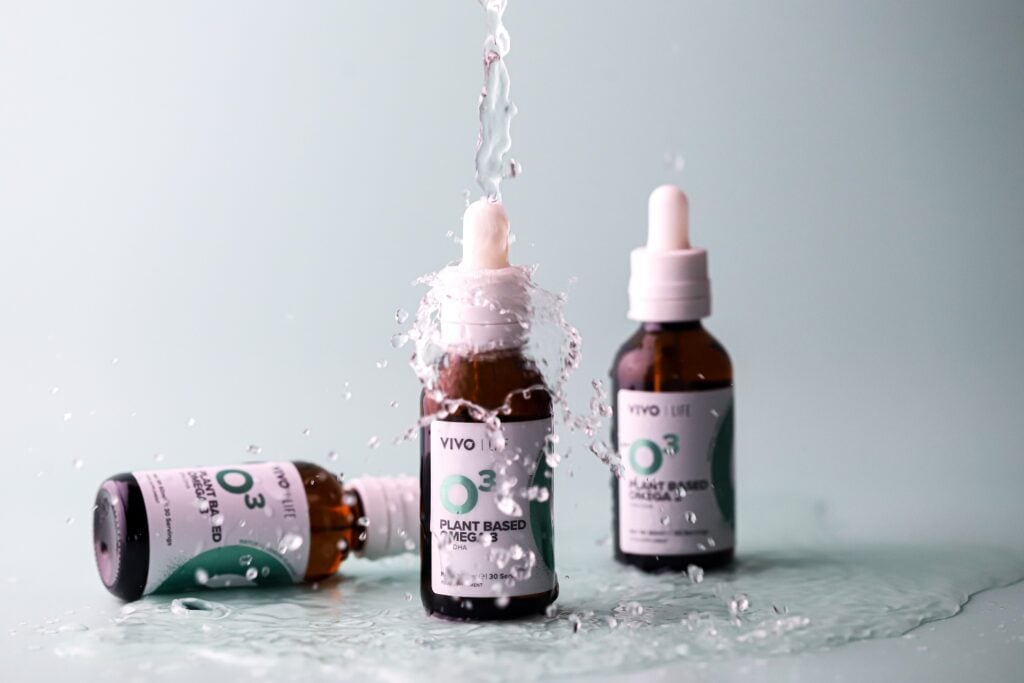
Humans have brains composed of nearly 60 percent fat9, a dense ocean critical for brain integrity and function10. Since our bodies can’t make the Essential Fatty Acid (EFA) building blocks of our brain, we must obtain them through what we eat, as we know that diets rich in Omega-3 fatty acids11 are critical for successful human growth and development—especially during pregnancy—and disease prevention.
Omega-3 fatty acid molecules come in three varieties: alpha-linolenic acid (ALA), eicosapentaenoic acid (EPA) and docosahexaenoic acid (DHA). ALA is found in plant oils, while EPA and DHA are typical in fish such as salmon and tuna, explaining the push for people to eat fatty fish of this kind regularly, or to take fish oil.
DHA comprises over 90 per cent of the total Omega-3 fatty acids in the human brain, providing optimal conditions for a wide range of cell membrane functions12, hugely important for the membrane-rich brain. These fatty acids also bolster our immune system, supporting good blood flow and the regulation of our inflammatory responses, even helping fight a range of autoimmune diseases.
Seeds such as flax, hemp and chia seed contain a form of Omega-3 called alpha-Linolenic acid, or ALA for short. ALA must first be converted into the longer chain Omega-3 fatty acids known as EPA and DHA for our bodies to use it. Unfortunately, the conversion rates of ALA to EPA and DHA are not good, with an average of 8 percent conversion to EPA and 0.5 percent to DHA, which means we would need to eat almost half a kilo of flaxseed daily to get only half a gram of DHA.
Misconceptions
Thanks to the constant messaging from health organisations and fitness gurus to eat fatty fish, it is a widespread misconception that these fish are the producers and sole source of Omega-3. Yet, the genesis of these fatty acids occurs as the sun beats down on the oceans blanketing our world, and the energy is converted into Omega-3 by algae—aquatic and photosynthetic organisms related to plants.
Algae13are eaten by krill—tiny crustaceans found in all the world’s oceans—which are then eaten by fish who go on to be caught and killed for the oil in their bodies.
All of these steps from algae, through krill, into fish, and finally to consumers may seem inefficient and more complicated than it needs to be, and it is. Similarly to how three-quarters of the world’s crop calories fed to animals are wasted14 due to the low efficiency15 with which animals convert crops to flesh and milk. Astonishingly, some farmed fish are even fed fatty acid supplements16 to boost their Omega-3 stores.
Cutting out the middle-fish and going straight to the source is more efficient, coming with a range of additional benefits for humans who want to sidestep heavy metals in their diets, reduce animal deaths, and not support the devastating impact of the fishing industry on our environment.
Heavy metal
Variously known for being the nearest planet to the sun and a fleet-of-foot roman god, Mercury is likely familiar to most as the mirror-finish liquid metal ‘quicksilver’, a heavy metal found naturally in air, water, and soil.
While some high-density heavy metals are essential nutrients like iron, or harmless eye candy like silver, other heavy metals, such as mercury, are highly poisonous. Mercury makes its way into the environment17 through natural processes like volcanic eruptions and forest fires, and humans compound this by burning mercury-emitting fossil fuels and waste.
Fish and shellfish absorb low concentrations of environmental mercury which accumulates and concentrates in their bodies over time as the highly toxic Methylmercury, which causes serious health issues when it exceeds a safe level in our bodies.
This problem is exacerbated for humans as larger fish of the kind promoted for their Omega-3 content18 like Mackerel, Trout, and Herring eat thousands of smaller, mercury-containing fish, leading to levels of mercury19 accumulating in their bodies over time.
Studies show that eating a lot of larger fish is linked to higher levels of mercury in the body, and exposure to even small amounts of this heavy metal may cause serious health problems affecting the nervous, digestive and immune systems, and the lungs, kidneys, skin and eyes, with people who become pregnant and young children particularly at risk.
The environmental impact of the booming fish market
With a 527 percent rise in global aquaculture production and a 122 percent rise in total food fish consumption since 1990, the world’s fish stocks are being severely exploited and overfished20.
As a result, the percentage of fish populations at biologically sustainable levels had decreased from 90 percent in 1974 to 65.8 percent by 2017, and 69 percent of fish stocks are classified as fully or overexploited.
Overfishing is closely linked to the deadly threat of bycatch21, where fishing operations unintentionally catch aquatic species other than the intended target. This includes the practice of bottom trawling, which decimates the sea bed and produces an amount of CO2 emissions similar to the aviation industry.
Modern fishing operations continue to rely heavily on fossil fuels22, compounding the negative environmental impact of associated emissions from fishing-driven construction, refrigeration, processing, and transportation.
In addition, it is estimated that 705,000 tonnes23 of fishing nets can be found in the Great Garbage Patch—an area twice the size of Texas in the Pacific that makes up most of the waste and debris found there, further polluting marine life and its surroundings.
Solutions from Vivo Life
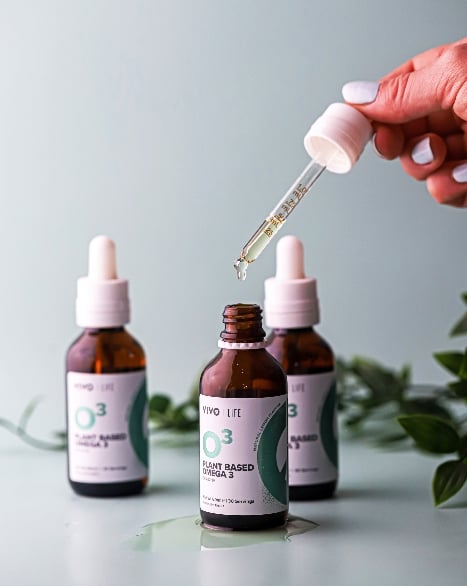
Vivo Life is a Glastonbury-based company producing 100 percent plant-based health and fitness products in a renewable energy-powered factory. Dedicated to helping people look and feel awesome without costing the earth, it turned its attention to producing an Omega-3 source that eliminates the health, environmental, and animal welfare issues generated from fatty fish sources.
Its Vegan Omega-3 uses ultra-pure EPA and DHA derived from algae sustainably grown in controlled environments in Iceland where they convert sunlight into Omega-3. As algae are much lower down the food chain than fish, this is a much more efficient and sustainable source of Omega-3 which results in no harm to oceanic ecosystems, accumulation of heavy metals or pollutants, or harm to marine life.
The Schizochytrium algae algae are harvested, and the Omega-3 rich oil is gently extracted to make the Vivo Omega-3 supplement. Each serving contains 600 mg of DHA and 300 mg EPA in a liquid form, meaning no fillers, binders or thickeners are used for capsules.
Vivo Life ensures that all of its products are independently tested for heavy metals. As a result, all of its products contain less than 0.1 mg per kilo of lead, arsenic, mercury and cadmium—far below the minimum safety standard set by both the EU and FDA—making them some of the cleanest products on the market.
More than holding their own in comparison to their fatty fish counterparts, plant-based Omega-3 supplements like those offered by Vivo Life may be even better for human health than those derived from fatty fish sources. In a 2018 Cochrane report24, it was discovered that taking fish oil supplements had minimal effect on heart health, maybe even causing thinning blood and acid reflux25, while Omega-3 fatty acid from plant sources has been shown to reduce the risk of cardiovascular problems.
Made in a certified organic facility, all ingredients are grown without herbicides, pesticides, and fungicides. Vivo Life has also developed the VGanic promise to ensure customers all of its products are not only 100 percent vegan, but also ethically and sustainably sourced, non-GMO, grown without herbicides or pesticides, and backed by science. VGanic also enables Vivo Life to reduce miles from source to supplement, and to support smaller community farmers committed to growing ingredients as nature intended.
For every order, Vivo Life plants one tree to support reforestation and agroforestry and reduce extreme poverty for local villagers, planting over 350,000 trees to date. It is also a certified carbon neutral company, offsetting carbon emissions from its deliveries, vehicle use, office electricity, and non-recyclable waste. Working towards zero waste, all Vivo Life cardboard, paper, wood, metal, glass and plastic is recycled. All orders are sent out in 100 percent recycled card boxes packed with 100 percent biodegradable eco fill made from corn starch to protect the products, and all packaging is BPA free.
Omega-3: the future is now
With algae offering a solution to the issues of Omega-3 sourcing from fatty fish, and the production process of Vivo Life and other plant-based Omega-3 producers being continuously refined as new species of algae are discovered, efficiencies are made, and environmental impact is reduced, cleaner, more ethical alternatives to fish oil are here now and here to stay, giving all of us the choice to be better to ourselves, the environment, and the fish we share our world with.
Give your body the power of Omega-3 with the 10 percent exclusive discount, head to the link and use the discount code PBN10.
* This is paid-for content; funds from this article help Plant Based News continue to provide millions of people around the world with free content they know and love. We only work with brands we support and use ourselves.
References
1 https://www.healthline.com/nutrition/omega-3-guide#benefits
2 https://pubmed.ncbi.nlm.nih.gov/17685742/
3 https://pubmed.ncbi.nlm.nih.gov/22023985/
4 https://pubmed.ncbi.nlm.nih.gov/22180524/
5 https://www.ncbi.nlm.nih.gov/pmc/articles/PMC3522136/
6 https://www.nhs.uk/live-well/eat-well/fish-and-shellfish-nutrition/
7 https://www.nhs.uk/live-well/eat-well/the-vegetarian-diet/
8 https://www.eurekalert.org/news-releases/690191
9 https://plantbasednews.org/your-health/health-wellbeing/why-your-brain-needs-fat/
10 https://pubmed.ncbi.nlm.nih.gov/20329590/
11 https://www.researchgate.net/publication/312097050_Omega-3_fatty_acids_Keys_to_nutritional_health
12 https://www.ncbi.nlm.nih.gov/pmc/articles/PMC3257695/
15 https://awellfedworld.org/feed-ratios/
16 https://www.healthline.com/nutrition/algae-oil
17 https://www.des.nh.gov/sites/g/files/ehbemt341/files/documents/2020-01/ard-28.pdf
18 https://www.nhs.uk/live-well/eat-well/fish-and-shellfish-nutrition/
19 https://www.fda.gov/food/metals-and-your-food/mercury-levels-commercial-fish-and-shellfish-1990-2012
20 http://www.fao.org/state-of-fisheries-aquaculture
21 https://www.msc.org/what-we-are-doing/oceans-at-risk/what-is-bycatch-and-how-can-it-be-managed
22 https://www.sciencedirect.com/science/article/pii/S0308597X1730893X
23 https://www.condorferries.co.uk/marine-ocean-pollution-statistics-facts
25 https://www.healthline.com/nutrition/fish-oil-side-effects
